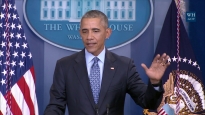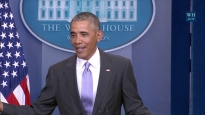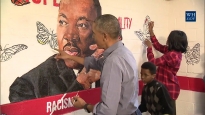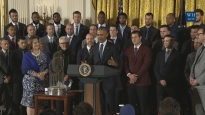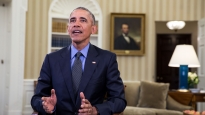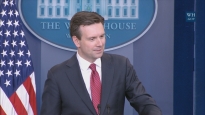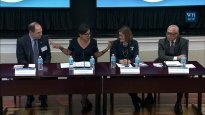Press Briefing 10/6/09
October 6, 2009 | 38:44
White House Press Briefings are conducted most weekdays from the James S. Brady Press Briefing Room in the West Wing. (public domain)
Download mp3 (36MB)
Briefing by White House Press Secretary Robert Gibbs, 10/6/09
THE WHITE HOUSE
Office of the Press Secretary
___________________________________________________________________
For Immediate Release October 6, 2009
___________________________________________________________________
For Immediate Release October 6, 2009
PRESS BRIEFING
BY
PRESS SECRETARY ROBERT GIBBS
BY
PRESS SECRETARY ROBERT GIBBS
James S. Brady Press Briefing Room
1:21 P.M. EDT
MR. GIBBS: Oh, everybody got quiet -- kind of eerie.
Q It's out of respect. (Laughter.)
MR. GIBBS: No, I know better than that, Mr. Feller. (Laughter.) I have no announcements, so take us away.
Q Thank you. A few questions on Afghanistan. The President said at the Counterterrorism Center today "We're making real progress in our core mission to disrupt, dismantle and defeat al Qaeda and other extremist networks" -- which is almost exactly what he said, as you know, back in March, when he announced the Afghanistan-Pakistan strategy. So I'm wondering, is this strategy review that's going on at all looking at what the mission is, why the U.S. is still in Afghanistan? Or is he saying the mission is clear, it's just a matter of how we go about it that's under review?
MR. GIBBS: Well, look, we talked yesterday and I said, I think pretty clearly, that leaving Afghanistan isn't an option. What the President laid out in March, as you mentioned, was a strategy that is focused not just on Afghanistan but also on Pakistan. We know and are first and foremost the President's -- what's on the President's mind are those that attacked us on September 11, 2001; those that have through the global network of al Qaeda have the intent and are actively planning to do so again.
All of that is part of what is being evaluated -- where we are, the progress that has been made in dealing with those different entities and the groups that are involved. All of that is going into -- and I think tomorrow's meeting focuses I think almost primarily on Pakistan.
Q When you say all that is being looked at, is the mission itself set and consistent, or is that being debated?
MR. GIBBS: The mission of disrupting, dismantling and ultimately destroying al Qaeda and its extremist allies, that's the focus of why we're there and what we're trying to accomplish. And I think -- I think the President used today's important visit to highlight the role that many individuals play in coordinating intelligence that we get here in the United States that helped to disrupt potential attacks as we've seen over the past many weeks.
Q Can you elaborate a bit about what the President wants to accomplish specifically with the meeting with lawmakers today?
MR. GIBBS: Yes, I think the meeting will start off with the President laying out where we are in the review and the process moving forward, and open it up to a Q&A with members of Congress. I think you all have a list of those that have been invited.
Look, obviously the President, as I've said repeatedly and he has, too, the President has and wants to hear from all of those that are involved in decisions about protecting our homeland, keeping our country safe, as well as the deployment of our men and women in uniform. And obviously Congress plays an important and significant role in that, and this is part of talking to them about this process.
Q Just one follow on that. Is that a process that the President thinks did not happen adequately under President Bush with the war in Iraq -- is this something he's trying to change?
MR. GIBBS: Which -- bringing Congress in?
Q Bringing Congress in -- and listening.
MR. GIBBS: Well, hard for me to grade that. I know that the President believes it's -- this President believes it's tremendously important to seek that input, Democrat and Republican, House and Senate, as we move forward. And that's the intent of the meeting today.
Q Just more on the meeting. I'm wondering if you can talk about what the role he sees for Congress in this. President Bush definitely saw the executive branch as having a lead role in deciding how many troops were going, and he would consult with Congress. Does President Obama take a different approach --
MR. GIBBS: Well, look, I mean, obviously there are different roles. One is the role of Commander-in-Chief. Another, obviously, though, is the role of -- through the appropriations process, particularly, in the resources that are needed to move forward. I think, obviously, that's an extremely important role. You can't do one without the other. And that's, I think, what -- part of what we'll -- I doubt they'll get into specific appropriations, but the strategy that would ultimately surround the need for resources from Congress.
Q There is growing skepticism, as you know, among many Democrats about a troop increase for Afghanistan. How important is that going to be in his decision-making process?
MR. GIBBS: Well, again, as I've said, the President hopes to and will hear from many across the political spectrum throughout this process. The decision he makes will be what he believes is in the best interest of this country and those that serve in uniform in protecting us. This is not a political debate or a political argument.
Q Okay, and just one follow-up on your comment, "Leaving Afghanistan is not an option." Is reducing the number of troops an option? How wide --
MR. GIBBS: Well, I'm not going to get into -- I think there's been this notion about -- whether there was a debate about everybody going home. As late as this weekend there were questions about that on some of the news shows. I think it's important to dispense with, as the President did in the very beginning of our second meeting last week in the Situation Room, with that notion.
Q Robert, in terms of the differences with the Bush administration, how they approached Iraq, back in the campaign the President was pretty critical of President Bush in March of 2008; talked about General Shinseki, for example, and how then-Senator Obama said, "At the beginning of the conflict, there were generals that said, this is going to require many more troops; will cost us much more. Those generals were pushed aside." If this President doesn't listen to General McChrystal when he says he wants 40,000, isn't he pushing a general aside?
MR. GIBBS: I appreciate the opportunity to dangle into hypotheticals, Ed, but there's a robust process that we've discussed -- I discussed some with you yesterday.
Q But if he felt then that you should listen to the commanders, why doesn't he listen to commanders now?
MR. GIBBS: I'm not going to get into hypotheticals. I appreciate that you fast-forwarded through the decision-making process. But we're going to focus on that process and getting it right. I'm just not going to get into hypotheticals.
Q Can I ask you a quick thing about China? Why is the President skipping a meeting this week with the Dalai Lama? In the campaign, he said he looked forward to meeting the Dalai Lama. Is he concerned about the Chinese government?
MR. GIBBS: We're concerned about the people in Tibet and we're concerned about the Chinese. I think the statement that the Dalai Lama and his supporters put out yesterday were fully in support of a meeting that will take place later in the year. They understand a strong relationship -- a stronger relationship that we have with China benefits the Tibetan people. I saw something that said a meeting had been postponed, and that's simply inaccurate.
Q A quick thing on the economy, in terms of the reports today saying that --
MR. GIBBS: We just did a quick thing on the Dalai Lama.
Q That was quick. That was quick. (Laughter.)
If -- the President talked about saving or creating 3 million new jobs with the stimulus. If you're now talking about new programs to -- for job creation, are you acknowledging that the first stimulus did not create or save those jobs?
MR. GIBBS: No. I think if you look at the -- understand the parameters that we talked about, and which you just accurately quoted, are based on a recovery plan that Congress enacted in the middle of February and we have implemented, understanding the recession didn't start in mid-February. We didn't start losing jobs January 21st. The job loss goes back to, if I'm not mistaken -- I'm looking at the graph in my head -- I think it's December of 2007.
So just as I said yesterday in yesterday's answer, that the recovery plan was not intended to dollar-for-dollar fill the gap or the hole that was created in the downturn in our economy -- which I think we said was about a $2 trillion gap -- 3 million jobs does not exceed the number that have been lost as a result of this recession going back to December of 2007.
Q Two quick questions, the first one back to Afghanistan. Does the President think -- yesterday, Secretary Gates said that this discussion should be candid, but it should also be happening privately. Does the President think that this is all happening too publicly, this military debate?
MR. GIBBS: Again, I'm not going to get in the way of parsing generals or secretaries of defense.
Q Come on. (Laughter.)
MR. GIBBS: I appreciate the repeated opportunity to do so. The President set up a process, and we're going through that.
Q Today, Cindy Sheehan was back outside the White House. Yesterday she chained herself to the North Lawn gate and got arrested. Today she is back, and she said she is actually moving to Washington. She is going to be out there until her complaints are addressed. Is the President, or anyone from the White House, going to meet with any of these protestors?
MR. GIBBS: Not that I'm aware of.
Chip.
Q You said a moment ago that at the beginning of the second meeting, last week's meeting, the President put to rest the idea of leaving Afghanistan. Was he making new -- was he saying something new when he said that?
MR. GIBBS: To you maybe, but not to us.
Q I just want to make sure -- he was not -- you're not suggesting that he was making a new policy, stating a new policy. You said he put that to rest then.
MR. GIBBS: Well, look --
Q Why did he need to make that clear? Wasn't that already policy?
MR. GIBBS: It was. It wasn't necessarily reflected in all the coverage. And as I said, one of the reasons --
Q But to the people --
MR. GIBBS: Well, sure. As I said, the reason I repeated it yesterday is there was -- there were hypotheticals set up on the news shows on Sunday that assumed one spectrum of this was everybody leaving Afghanistan. That's simply just not the case.
Q So he was not -- I was just struck by the fact that you said he made that clear in that meeting, when I would think everybody in that room was well aware of it.
MR. GIBBS: No, I mean, I think he set out the parameters of -- that if you see people out there talking as if the decision is, on one end, everybody leaving Afghanistan, that's not the case.
Q Tomorrow is the number three meeting. Is it the same cast? And will there --
MR. GIBBS: I don't know if there are any additions. We will try to put in the guidance tonight if there are any additions. I assume most of -- I don't know if there's anybody that's being added as a result of Pakistan in particular, but my sense is that the people that were in there last week will largely comprise the people that will be in there this week.
Q And did the President give any marching orders of what he wanted people to do between these two meetings to prepare for the third? Is there any agenda, specific agenda for this one?
MR. GIBBS: I don't have the agenda with me. This one is going to focus on Pakistan. But without getting into detail, yes, the President was -- the President and many that were staffing the meeting understood what needed to be prepared for this one.
Q And did he give them homework in the meantime?
MR. GIBBS: I think it's safe to say that there have -- this has resulted in work that didn't necessarily fall in the confines of a 9:00 a.m. to 5:00 p.m. workday.
Q Everything on Pakistan, or is there a particular --
MR. GIBBS: Just the larger focus on Pakistan.
Q Are we nation-building now in Afghanistan? Or is that part of what's in the strategic review to make the decision whether we should be involved in nation-building?
MR. GIBBS: Well, again, I think there's a -- like I said, a larger assessment that's going on about moving forward in Afghanistan and Pakistan.
Q Is nation-building part of that?
MR. GIBBS: Well, I'll let the process work and the President speak for what decisions are made.
Q Follow-up on Congress's role. Besides a funding role, would you -- would the White House be open to letting Congress express its opinion about whether to send more troops?
MR. GIBBS: I don't -- I'm not sure they're looking for permission from us to do something like that.
Q So Congress -- you wouldn't necessarily go to Congress to ask for more troops?
MR. GIBBS: Well, you have to, in terms of funding. I don't know if you were talking -- what I meant in my original response was, I don't know if you meant some resolution before some decision. I don't have any opinion on that.
Q And when do you expect that you're going to have to go before Congress for new funding on this? Would you ask for a supplemental or is it --
MR. GIBBS: At some point when a decision is made. But I don't have a timeline on funding.
Q We are missing yet another deadline on health care. The Senate Finance Committee, I guess -- it was supposed to be last week, and it was like, no, no, no, they'll vote it out Tuesday. Today we're hearing, oh, no, no, Wednesday. Now it doesn't look like you're going to get a bill at all this week. Is there any -- are you guys frustrated with how long Max Baucus has taken from actually finishing the markup to holding a vote?
MR. GIBBS: No, the committee -- I think I got a question last week, "Are we rushing?" So it's interesting -- good to know that the leaves are not the only thing changing. I think the committee believes they're making progress, and I think whether it's Wednesday --
Q What's left? I mean, they already voted on all the markups. The bill is the bill, right?
MR. GIBBS: Well, I think they're waiting for -- as I understand it, they're waiting for some CBO estimates for members to --
Q Max Baucus has the votes. Why hold off?
MR. GIBBS: Better question for Senator Baucus.
Jonathan.
Q If last week's meeting was on -- was basically an assessment of the situation, and Pakistan is the focus tomorrow, does that mean that Friday's is on troop levels? When does -- when do you tackle that one issue?
MR. GIBBS: We spent three hours last week, and troop levels didn't come up. I don't know if that's Friday or that's some time the week after.
Q And on health care, Senator Reid has a big -- some big decisions, because he's going to be putting together the bill that actually goes to the floor of the Senate. And I'd like to just know when -- what role the White House sees itself playing in putting -- in helping to put together the bill that actually goes to the Senate floor? And do you want to see a public option on the bill that's on the Senate floor?
MR. GIBBS: We've played the public option game each of the last many days. Obviously Senator Reid is, as the leader of the Senate, going to make decisions that merge two pieces of legislation in conjunction with members of both committees that have been working on this legislation, and I assume that they'll ask the White House for varying opinions on different issues. But mostly something that Senator Reid --
Q And can you give us some idea of who's up there now from the White House, and who's consulting on this?
MR. GIBBS: I don't have any knowledge of who's up there now. I don't assume it's any different than the people that have been working on health care, starting last February.
Mark.
Q Robert, can you say what the reason is that the President won't meet with the Dalai Lama until a later time? Is he worried about irritating Chinese leaders before his visit?
MR. GIBBS: No, the --
Q Is that a component?
MR. GIBBS: There was an agreement to do this later in the year, and that's what's going to happen.
Q Is he worried that he might be seen kowtowing to Chinese leaders by not meeting with the Dalai Lama on his forthcoming coming visit?
MR. GIBBS: No, again, Mark, as I said, it's important that Tibetans -- Tibetan people know that our relationship, our strong relationship with China helps them. So I think this was mutually agreed upon, and it's what's going to happen.
Q Helpful, how so?
MR. GIBBS: Our relationship with China -- having a strong relationship and a good dialogue with them allows us to talk to them about the cares and concerns of the Tibetan people.
Q Has the President done that?
MR. GIBBS: I believe we have mentioned human rights in meeting with the Chinese, yes.
Q And what does meeting with the Dalai Lama later have to do with making a strong relationship with China? I don't understand.
MR. GIBBS: What I'm saying simply is that you can't -- you all are assuming that if you meet with one first or one later, that that sets up some sort of sequencing that believes you can't meet with both on a certain timeline or something that has --
Q That's your decision.
MR. GIBBS: It was our decision, and it was one that was mutually agreed upon.
Q Is your schedule that full?
MR. GIBBS: It is based on your questioning, yes.
Q Robert, back to stimulus. The White House is supporting an extension of jobless benefits, is that correct?
MR. GIBBS: I will say I don't know the particulars that are being discussed in Congress in terms of each of the proposals. Obviously we're going to get to a point at which some extension, legislatively, has to be entered into, yes.
Q And the White House would be backing that?
MR. GIBBS: We would support making sure that safety-net policies continue to be in place, yes.
Q And what about an extension of the first-time tax credit for homebuyers?
MR. GIBBS: I think that's something that the policy team is working through.
Q Okay, still kicking that around, then. Will the White House be offering a package of stimulus measures before the President leaves for Singapore, or are you going to wait for Congress to come up with them and he will simply say yes or no?
MR. GIBBS: I'm sorry --
Q Will the White House propose a package, or are you going to let Congress do it?
MR. GIBBS: Of? Are you talking about the safety-net stuff? I think we have been working with Congress for quite some time on this. I don't know which comes first, but we're working in conjunction with, and I think there's bipartisan agreement to extend safety-net to ensure that those that have fallen on hard times and have lost their job have the benefits they need to provide for their families.
Q Wall Street was up 126 points at the beginning of this briefing here, partly --
MR. GIBBS: Let's hope it's still the same.
Q -- partly on talk of stimulus, so I thought maybe you might have more to say whether the White House might offer something.
MR. GIBBS: I don't know the correlation between what I might say and what the stock market may do, and I think it's best to leave that unsaid.
Yes, sir.
Q Robert, today at the National Counterterrorism Center, President Obama did not mention the word, "Afghanistan." Why is that?
MR. GIBBS: I think the President mentioned regions of the world that threaten this country. I think we talked about -- I don't have the list in front of me -- but the Horn of Africa, different places in Asia, Southeast Asia. I don't think -- the point wasn't a geography bee to mention each and every country in and around the world, but instead to focus on ensuring that we keep the fight on al Qaeda's global network, that we take on al Qaeda and its extremist allies, and most importantly that we thank the men and women that work there each day to help keep our country safe and coordinate the type of intelligence we need to disrupt the active planning of the al Qaeda global network in attacking us.
Q Is there a concern here that Afghanistan could once again become a safe haven for al Qaeda?
MR. GIBBS: Well, look, I think obviously that's part of what's being discussed, understanding that most of, if not almost all of, the group of people that attacked us through al Qaeda on 9/11 and is planning through intent, actively planning and intending to try to attack us, have --
Q How do you know that?
MR. GIBBS: -- intelligence -- mostly are now in the country of Pakistan.
Q Today on the Hill there's a hearing being held examining the history and legality of executive branch czars. Your thoughts on that title for a hearing, and any reaction to a hearing being held on that?
MR. GIBBS: Well, I don't know if they're calling -- I don't know if Senator Feingold is calling Franklin Roosevelt to be a witness on the -- I forget the lofty -- said lofty scholarly title of said hearing. I would assume that Congress and Senator Feingold have more weighty topics to grapple with than something like this.
Yes. Hold on, I'm going that direction, so --
Q Okay, good.
Q You had -- you'd said earlier that -- referring to Congress and Afghanistan -- that this is not a political debate, but there's a lot of politics surrounding it on Capitol Hill.
MR. GIBBS: Well, let me make sure that I -- what I'm saying is, the President isn't making his decision based on politics. I'm certainly not suggesting -- obviously the debate is within Congress and inherent in that is a political debate. The President isn't making his decision based on politics, but instead on what is best for this country.
Q Okay, but what is the White House's understanding of the politics of this on Capitol Hill? And how do you think that will affect the President's decision as he goes through this review process?
MR. GIBBS: Well, I think we'll get a good readout of some of that this afternoon. I think you've got -- my sense is that you've got many different opinions encompassed in 535 members of the House and the Senate that probably span a full range of options.
Again, the President will -- the meeting today deals primarily with the bicameral, bipartisan leadership and then the ranking -- the chairs and the ranking members of the -- many of the relevant appropriations and oversight committees that would deal with this. And the President looks forward to hearing their viewpoints, again, as varying as I assume they may be.
Q Just a quick follow-up. In general, though, you have Republican congressional leaders much more supportive of an expanded war effort along the lines of what General McChrystal has outlined in his assessment, Democrats far more skeptical, particularly on the question of combat troops. How does that affect the way the President thinks about this, or how might it affect this process?
MR. GIBBS: Again, the President's focus is on ensuring that we have the very best strategy going forward for this very important yet dangerous region of the world. We're focused on getting that right, not about who is for and who is -- who's for and who's against what, but focusing on how to get --
Q But it will matter at some point. It will matter at some point with resources.
MR. GIBBS: It will. And obviously, whatever decision that is made, the President will talk about and talk probably again to members of Congress who have equities in this.
Q In the "Meet the Press" interview that he did a couple of weeks ago, the President stepped back it seemed a little bit, and explained -- or he said there was a need to explain the reason that America was in Afghanistan, because 3,000 Americans were killed by al Qaeda. It just strikes me as odd that he did not mention Afghanistan again today. So as a follow-up to Mike's question, are we really to believe that it was an accident that it wasn't mentioned at all, or that Afghanistan was not mentioned because there are many places --
MR. GIBBS: Yes, because maybe Afghanistan wouldn't come up today? (Laughter.)
Q I know, but is Afghanistan --
MR. GIBBS: That seems somewhat unlikely, since --
Q Why wouldn't he mention Afghanistan at all?
MR. GIBBS: I'd have to --
Q Just a couple weeks ago, it seemed like he saying that we need to refocus on Afghanistan.
MR. GIBBS: I'd have to go -- I don't recall right offhand what he said in that transcript, but I --
Q I was going to follow-up on that. He said, "We know that al Qaeda and its extremist allies threaten us from different corners of the globe, from Pakistan" -- and then went on to list -- it sounds like they intentionally left the word "Afghanistan" out, I assume because they do not believe that we are threatened by al Qaeda in Afghanistan. Is that --
MR. GIBBS: Well, I just mentioned that -- I did just mention that if you look at those that attacked us on 9/11, based on our going into Afghanistan eight years ago tomorrow, most of those have moved across the border into a different region of Pakistan. I think that was talked about on the news shows.
Q So there really are -- how many al Qaeda members -- there's been a -- one senator said today said less than a hundred in Afghanistan. Is that a fair number?
MR. GIBBS: I wouldn't get into the intelligence. But I don't know what -- I wouldn't know how to dispute something like that.
Q Thank you, Robert.
Q I interrupted Jeff, so I yield the floor to --
Q I always yield to CBS. (Laughter.)
MR. GIBBS: You guys are polling partners.
I'm sorry, do you have one more?
Q No.
MR. GIBBS: You're good?
Q I'm good.
MR. GIBBS: The gentleman yields back the remainder of his --
Q That was good.
MR. GIBBS: Yes, ma'am.
Q Thank you, Robert, two quick ones. The administration is spending billions on the war in Afghanistan and on the war on terrorism. Couldn't the administration find a few million to help the schoolteachers be rehired in the District of Columbia? Have you spoken to them, or considered this at all?
MR. GIBBS: I don't know what the story is.
Q Would you look into that? Would you --
MR. GIBBS: Well, I mean I assume that different entities have gotten recovery money. I know throughout the country recovery money that has gone to states and localities has helped to keep teachers, to keep police, and to keep firefighters on the job. I don't know the specific instance with which you're talking about.
Q And one more quick one. CBS and the other networks are doing some really good features on Afghanistan. Do you know if the President -- he hasn't paid me to say this -- and I'm not saying anything about David Letterman -- do you know whether --
MR. GIBBS: He doesn't appear to be focused on Afghanistan. (Laughter.)
Q Seriously, these are very powerful features. Do you know if the President or his staff see any of these features and are influenced in any way by them?
MR. GIBBS: Dare I say, I watch the news every night. But I don't know what the President -- I don't know whether the President has seen of the reporting from there on CBS or from other networks.
Q I have a question.
MR. GIBBS: Yes, ma'am.
Q I want to know if the President has ever explored the possibility of peace -- talking to al Qaeda and to the Taliban? Has there been any contact, since you have so much intelligence?
MR. GIBBS: I don't -- I don't think al Qaeda looks to talk with us. I think al Qaeda has the intent and is actively --
Q We had the same idea about Vietnam.
MR. GIBBS: Well, I can't speak to the intelligence around Vietnam. I don't think that al Qaeda and the global network that have taken part in the very heinous acts that we've seen over the course of many years is intent on talking. I think, as the President said in his inaugural, they're intent on blowing things up, and this world is not going to be judged by --
Q All enemies do that. But at some point you reach some -- I never hear the word "peace" here.
MR. GIBBS: Well, we're -- I'm not sure that you're ever going to hear the word "peace" and "al Qaeda" in the same sentence, because I'm positive, based on the intelligence, that that's not what al Qaeda's mission is.
Q My one other question is that there are several columns today saying the President just doesn't get it, in terms of unemployment and Afghanistan and so forth. What's your response?
MR. GIBBS: Isn't America great, where everyone can have an opinion, and --
Q Sure is.
MR. GIBBS: "Often wrong but never in doubt" is a great slogan. (Laughter.)
Q The President's predecessor not only went to Capitol Hill and appeared with the Dalai Lama and spoke at a ceremony honoring him, but he also, the President also --
MR. GIBBS: I think that was -- I think that was a, if I'm not mistaken, wasn't that a congressional medal awarded to him, so the ceremony -- right.
Q Yes, and the President spoke at it. And the President also -- the former President also went to Beijing for the Olympics, saying that he wanted to show respect. Can you explain again why President Obama feels that a meeting now with the Dalai Lama would either complicate or in some other way injure President Obama's relations to China?
MR. GIBBS: No, no, I'm simply saying that in discussions with them we agreed --
Q "Them"?
MR. GIBBS: -- the Dalai Lama and his staff -- that a meeting would be had later in the year.
Q What I'm asking is the reason being?
MR. GIBBS: It's the time in which both parties thought it would be the best time to meet.
Q Do you have a date?
MR. GIBBS: I don't.
Q Robert, yesterday Secretary Gates said the reality is that "because of our inability to put enough troops into Afghanistan, the Taliban do have the momentum right now" --sounding like he thinks there's not enough troops there. I'm wondering how --
MR. GIBBS: I don't want to parse Secretary Gates's words, but --
Q It seems pretty straightforward.
MR. GIBBS: -- I think, if I'm not mistaken, he's referring to a request that sat on the table for a long time previously. We added 21,000 troops to Afghanistan through an effort earlier this year.
Q You're saying he was referring to the troops who were already --
MR. GIBBS: That's the way I read it. I think if you're looking for a response to that, I'd -- Geoff Morrell is over at the Pentagon.
Q And one other quick question on health care. Less than 10 days from now, Senator Reid has to decide on whether he goes for reconciliation or not, goes for a 60-vote strategy or 51. Do you have any sense in terms of how the debate has been going which makes the most sense?
MR. GIBBS: I don't have any opinion on that except to reiterate that we're working through the process in the fifth committee of jurisdiction, and the Senate will merge these two pieces of legislation, and will head to the floor.
Q Robert, there's been another report, this one in Politico, previously in the Wall Street Journal, that Greg Craig is preparing to leave as the President's counsel. Does he still have the President's confidence, number one, and is the President --
MR. GIBBS: Matt, I answered this last week when that report was passed to me by the group representing the institution that wrote it, and I said he was, and I said he'd been in the Oval Office earlier that day speaking to the President about Guantanamo. Greg Craig is in the President's office every day as part of a small group of senior advisers that meet with him daily. That'll happen at 4:30 p.m. this afternoon.
Q And does the President still have confidence in the timetable on Guantanamo Bay?
MR. GIBBS: Well, we went through that. I think we're making progress on ensuring that once and for all Guantanamo Bay is closed.
Peter.
Q Robert, the DNC has been emphasizing Republican elected officials outside of Washington who support health care reform. Does the White House believe that Republicans on Capitol Hill are out of step, in some way, with Republicans in the rest of the country, or Republican elected officials outside the beltway?
MR. GIBBS: Well, look, I think if you -- the intent of the desire of Republicans in Washington and on Capitol Hill, as it relates to health care, is something I'll let them answer. As I've mentioned before, the person that they chose earlier in the year to speak to the nation has actively encouraged the Republicans in Washington and on Capitol Hill to put forward an alternative, something that thus far their leaders have said repeatedly isn't and won't happen. I think that shows they are wildly out of step with their constituents who want something to happen on health care this year.
I would mention, obviously, you've got -- whether it's Mayor Bloomberg, whether it's Governor Schwarzenegger, whether it's former HHS Secretary and Governor Tommy Thompson -- there are people that have been outside of the cocoon of Washington, dealing with rising health care costs, what it does to state and local governments, what it does to families, and what it does to small businesses that are actively encouraging the process that's working to take place.
I think it would be a good message -- I hope that Republicans in Washington hear the message of Republicans all over the country that it's time to come in off the sidelines and actively get involved in making some serious progress on health care reform this year.
Yes, sir.
Q You said a couple times that politics is not part of the decision on Afghanistan. I have two questions. One, does American public opinion weigh into the decision at all, and the idea of having the same public support for the war? And secondarily, have you done any polling through the DNC or anywhere else on this question?
MR. GIBBS: On the second one, not that I'm aware of. On the first one, in terms of the role that public opinion would play, obviously the President sees where different opinions are, based on polling that you guys do. But the President is going to make a decision, popular or unpopular, based on what he thinks is in the best interest of the country. I think if you look back over the course of the last eight to nine months, I don't think you would say that the decisions -- every decision that we made was based on where a majority, or a great majority of the people were in this country.
But the President has made decisions that he thinks -- whether it's on the domestic issues, whether it's on the economy, or whether it comes to our way forward in Iraq -- I'm sorry, Afghanistan -- that he's doing what's in the best interest of the country.
Q Don't you need public support, though, if you're going to -- talking about a long-range commitment of troops?
MR. GIBBS: I think that, again, whatever decision the President makes with his team, I think explaining and talking that through with the American people will certainly obviously be an important step in this process.
Yes, sir.
Q Thank you, Robert. Can you tell us what message the Vice President is going to convey to Poland and the Czech Republic on missile defense? And is this a damage control mission?
MR. GIBBS: No, look, obviously, the President -- the Vice President is somebody who has long relationships throughout Europe. They're important allies of ours. He'll continue those relationships and meet with them on his upcoming trip. I think most of you all now have covered statements by those governments that reflect -- after understanding what we were actually deciding and what we were implementing -- a missile defense system that protects a greater geographic area and addresses much more directly the threat that exists in the here and now, rather than something that was technologically a ways off. I have no doubt that the issue will come up, and I think the Vice President will be very comfortable, as will our allies, in the decision that we've made.
April.
Q Robert, did then-candidate Barack Obama warn or tell the American public about the levels of engagement that the U.S. military would be involved in, in Afghanistan when he was running for President?
MR. GIBBS: I don't think anybody in this country, whether they were listening to candidate Barack Obama, or anybody over the past seven or almost eight years, has been misinformed as to the sacrifice that our men and women in uniform were making, or what it was going to take in dealing with a very difficult part of the world.
Q Still, some people are saying that he made a point to stress that we would pull out of Iraq, but it was somewhat omitted about the engagement in Afghanistan.
MR. GIBBS: The President -- I remember a speech quite clearly where the President talked very specifically about Afghanistan and Pakistan and was criticized on both sides of the aisle. I spent a lot of time with the President over the course of two years flying around the country. He almost always talked about the need to add forces that were added -- that exceeded the number -- we exceeded the number that were added in March than what he called for in the campaign. So this wasn't something that the President ever --
Q Thanks, Robert.
Q Can you talk about Chicago tomorrow, what they're going to do in Chicago tomorrow?
MR. GIBBS: I don't have any more information other than -- or a schedule for Secretary Duncan or Secretary -- Attorney General Holder. I would --
Q Any news, any policy?
MR. GIBBS: Not that I'm aware of, no.
Q Thanks, Robert,
MR. GIBBS: Thanks, guys.
END
2:00 P.M. EDT
2:00 P.M. EDT
|
January 18, 2017
|
January 17, 2017
|
January 16, 2017
|
January 16, 2017
|
|
January 14, 2017
|
January 13, 2017
|
January 13, 2017
|
January 12, 2017
|
